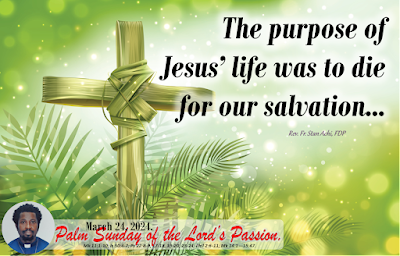FROM ADULATION TO DEFAMATION: HOSANNA, CRUCIFY HIM.
March 24, 2024.
Palm Sunday of the Lord’s Passion.
Readings: Mk 11:1-10; Is 50:4-7; Ps 22:8-9, 17-18, 19-20, 23-24; Phil2:6-11; Mk 14:1—15:47.
“Hosanna! Blessed is he who comes in the name of the Lord!
Blessed is the kingdom of our father David that is to come! Hosanna in the
highest!” Mk 11:10
A Kikuyu proverb says: “To be praised is to be ruined.” An
Akan proverb adds: “He is a fool who praises the fruit of a tree and forgets
its roots.”
Mankind is emotionally oriented. And our emotions can change
from one moment to another. The ancient philosophers spoke of human
versatility, that is, a capacity to turn from one situation to another one at a
glimpse. Taken in a certain sense, this is a very positive characteristic. The
word versatility describes having many different skills or qualities.
Versatility allows you to adapt to many different situations. Nevertheless,
when it comes to emotional and interpersonal relationships, being versatile
could be a quite negative thing with strong impacts on life.
We are entering today, the center or the epitome of our
Lenten Journey, the week of the Consummatum Est that will end with the Passion
and Death of the Lord and open us to a New Hope, his Resurrection. And a
picture given to us is that of how people treated Jesus, an image of how we,
too, do treat him daily. They began the week by hailing him with branches from
trees; but by the week's end, it was upon the tree that he hung in seeming
failure, in utter loneliness and disgrace. The one who was hailed with great
Hosannas will end up with shouts of defamation, "Crucify Him!" One
could be tempted to ask, what has completely turned or transformed the cries of
adulations into shouts of defamations and rejections. What did Jesus do to
them? The answer is double parted, on the human aspect, it is about
inconsistency and versatility. But from a divine viewpoint, it is not a human
purpose or plan but an eternal, divine hand at work, guiding the events in
fulfillment of God's salvation plan.
We open today the week in which all things will be
fulfilled. The great saints call it, the
week of the "Consummatum Est". For, in the current of this week, the
Lord Jesus will consume his passionate love for man. He will utter the loud cry
while dying on the Cross, “It is finished!” It refers to the debt being paid in
full, the fulfillment of the Old Covenant, the completion of the sacrifice, and
the complete gift of self. (John 19:30) What we celebrate this week could be
seen primarily as a termination point, then by extension, the end to which all
things relate, the aim, the purpose. The purpose of Jesus’ life was to die for
our salvation. “Behold, this child is destined for the fall and rise of many in
Israel, and to be a sign that will be contradicted (and you yourself a sword
will pierce) so that the thoughts of many hearts may be revealed.” (Luke 2:34)
"How will Jerusalem welcome her Messiah? Although Jesus
had always refused popular attempts to make him king, he chose the time and
prepared the details for his messianic entry into the city of "his father
David". Acclaimed as son of David, as the one who brings salvation
(Hosanna means "Save!" or "Give salvation!"), the
"King of glory" enters his City "riding on an ass". Jesus
conquers the Daughter of Zion, a figure of his Church, neither by ruse nor by
violence, but by the humility that bears witness to the truth. And so the
subjects of his kingdom on that day are children and God's poor, who acclaim
him as had the angels when they announced him to the shepherds. Their
acclamation, "Blessed be he who comes in the name of the Lord", is
taken up by the Church in the "Sanctus" of the Eucharistic liturgy
that introduces the memorial of the Lord's Passover." CCC. 559
After the great acclamations and Hosannas, we witnessed the
blessing of palms, and the liturgy of the word plunges us into the passionate
love and the mysterious death of the Son of Man, the Son of God.
The prophetic vision of Isaiah is fulfilled in the Gospel.
Without any complaint or rebellion, Jesus will face his agony, be led in
trials, be condemned unjustly upon false witnesses, carry the cross, travel the
journey to the Calvary, be nailed on the Cross, and die. In so doing, as says
St. Paul to the Philippians, the Lord gave us a lesson on humility, obedience,
and total self-surrendering to God's will. In his passion and death, it is not
a human will and project being accomplished, but God's will. God does fulfill
his will showing us how versatile we can be as humans.
We are relatively taught that suffering and joy are intrinsically interconnected and that our suffering of the moment will open us to greater joy. As says the proverb, there is no glory without sacrifice. May we, like Jesus enter our daily passions and make them a journey of love, obedience, and humility, accepting to undergo all the needed sacrifices for our own future glorification. Let’s not forget. This Sunday is Passion Sunday; next Sunday will be Easter Sunday. No tears are permanent.





Comments
Post a Comment